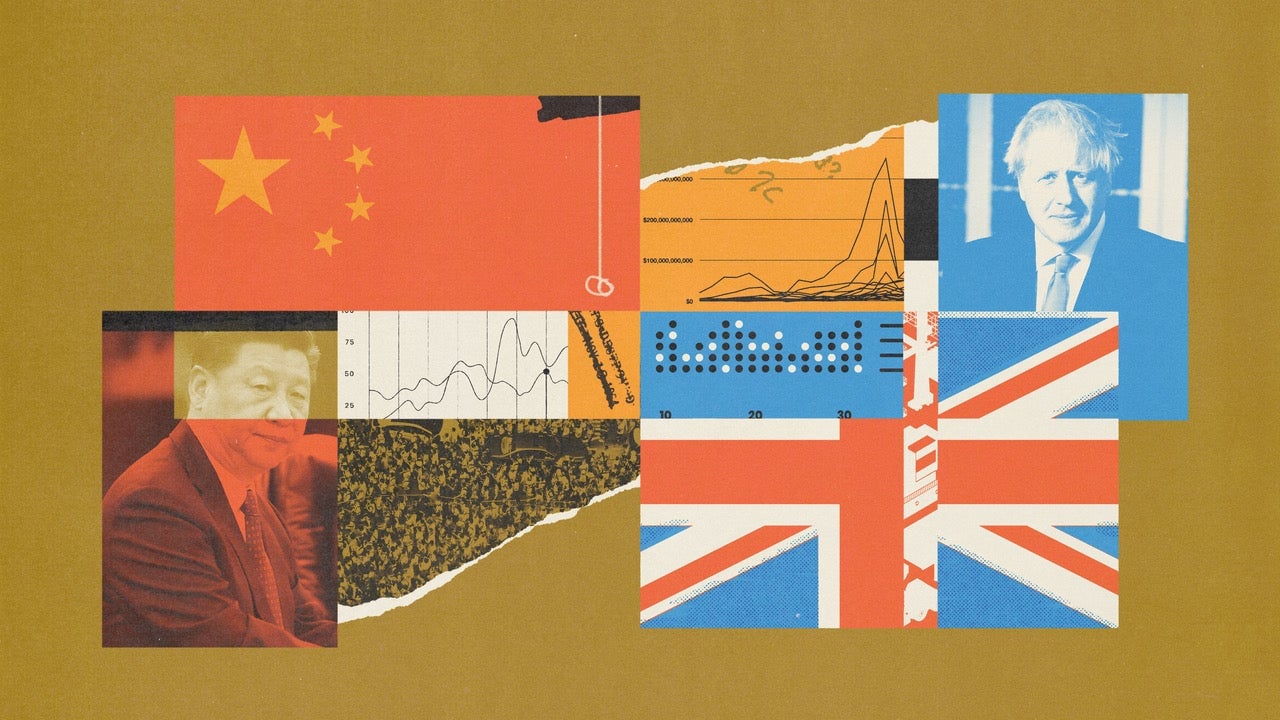Weekend edition—The UK-China relationship, Covax crisis, anticipated regret
Good morning Quartz readers!


Good morning Quartz readers!
In 1988, British historian Paul Kennedy set off a furious debate in the US when he argued in The Rise and Fall of the Great Powers (pdf, p. 514) that Washington would soon face the same “great tests” that felled other superpowers before it—and that it would likely fail those tests, leaving American statesmen with the unenviable task of managing their own decline.
While that is up for debate, I was struck when reading the book more than 30 years later by how many of the predictions it made actually came true. So I turned to another chapter, this time to see what Kennedy had to say about China.
“When the People’s Republic of China began to assert itself in the years after its foundation in 1949,” he writes, “there were few observers who did not take it seriously. …[T]he sleeping giant in the East would clearly be a major force in world affairs just as soon as it had organized its 800 million population for national purposes.”
Now, China has a population of 1.4 billion (though its growth rate is admittedly slowing). It is the second largest economy in the world, and the second largest military spender. China is using its growing influence in international institutions like the United Nations to shape the rules underpinning the global order to its advantage. It’s also ruffling a lot of feathers along the way.
The UK is case in point. The pandemic has closed a chapter of Sino-British relations in which London bet that it could reap some of the benefits of China’s rise through ever-closer engagement with Beijing. Now, public opinion of China in the UK is at a low point, and the government is caught in a tug-of-war with Parliament on what it should “do about China.”
This debate is playing out among the small community of politicians, academics, and activists who shape the UK’s long-term approach to China. In a series this week, I speak to 12 of them, with the aim of offering some insight into where the UK-China relationship—and by extension, China’s relationship with Western countries—is going. —Annabelle Timsit
Five things from Quartz we especially liked
Should at-home rape kits be commercial products? MeToo Kit, a startup selling slickly designed DIY kits for collecting sexual assault evidence, was lambasted for its perceived logistical and ethical failings when it launched in 2019. Annalisa Merelli’s insightful reporting will have you questioning that reaction, especially in light of pandemic-related rule changes. Perhaps the young founder, a survivor herself, deserves a fairer reception for the company she now calls Leda Health. —Lila MacLellan, senior reporter
A Covax crisis. The program was supposed to help low-income countries get Covid-19 vaccines. But it’s already running into major problems—namely, getting enough vaccines to fulfill its promises. Samanth Subramanian writes about what it will take for Covax to meet its distribution goals, and what’s at stake if it fails. —Alexandra Ossola, membership editor
How anticipated regret shapes our decisions. When bitcoin prices plunged this week, many crypto traders tried to convince others to hold by harnessing the power of anticipated regret—how bad would they feel about missing out if bitcoin reaches new heights later on? While some might consider this emotional manipulation, Lila MacLellan explains that our fear of remorse can also be used for good, as with Ohio’s lottery for vaccinated residents. —Sarah Todd, senior reporter
Lending a helping hand. For many struggling through India’s latest catastrophic Covid-19 wave, one name has consistently been a beacon of hope: Hemkunt Foundation. Niharika Sharma looks at how this small organization, out of sheer determination, was able to help get oxygen not just to patients, but hospitals, when even the government seemed unable to do so. —Annalisa Merelli, reporter
Off-putting offsets. An April research paper analyzing 100 certified carbon offsets found that 90% of them—whether supporting forest conservation, sustainable farming, air capture technology, or other means of reducing emissions—either failed to offset as much as claimed or were damaging to local communities or ecosystems. Tim McDonnell examines the crucible for carbon offsets, and suggests the growing number of companies that use them ought to start asking more questions, and perhaps pay more for high-quality options. —Heather Landy, executive editor
One membership thing that made us 🛍
As e-commerce makes up a bigger part of companies’ sales, retailers are reassessing what brick-and-mortar stores are good for. Here’s a snapshot of what that looks like, by the digits:
800,000: US stores that could close by 2026, according to UBS
16%: US retail sales done online at their 2020 peak
36%: UK retail sales done online at their 2020 peak
>50%: Estimated 2021 retail sales done online in China
17,000: Square feet of the outdoor turf field at Dick’s Sporting Goods’ “House of Sport” concept store
✦ Physical stores aren’t going away—they’re just changing. We’ve tracked some of those evolutions in our field guide to what stores are for now. What’s a Quartz membership for? Keeping up with the latest global business news and trends. For a limited time, get 40% off by using the code RETAILWEEK.
We’re obsessed with thrifting

What goes around comes around. Starting in the 1950s, pop culture, counterculture, and high-brow culture drove followers to secondhand stores to find items from yesteryear that might better reflect their interests (and cost them a lot less than your standard department store find). Nowadays, the internet has opened up a whole new world for thrifting, and business is booming. Go on the hunt with the Quartz Weekly Obsession.
Get the Weekly Obsession email sent to your inbox, for free!
Five things from elsewhere that made us smarter
Lois Lew, virtuoso typist. Stanford University professor Tom Mullaney caused a mini commotion when he first tweeted about Lois Lew, the beguiling virtuoso operator of IBM’s ill-fated electric Chinese typewriter. His riveting research caper, published in Fast Company, bears a lesson about how to study technology: Look beyond the machine and seek the human story. — Anne Quito, design reporter
What’s (still) going on. Marvin Gaye’s 50-year-old masterpiece What’s Going On is filled with rage against the injustices faced by Black Americans that sadly have not changed much in the last five decades. But as Vanderbilt professor Emily Lordi writes in the Guardian, the album was also “for his own people in his own time.” Songs like “What’s Happening Brother?” checked “the claims of those in power against the authority of everyday Black people” by drawing from Gaye’s personal experiences and those of the people close to him. —Hasit Shah, news editor
“Pandemics always end.” This isn’t the first time a respiratory disease has crippled the world, nor will it be the first time a deadly virus transitions from a pandemic to endemic. The virus that caused the 1918 Spanish flu, for example, is still around today but in a much milder form. While we don’t know for sure the same will be true for Covid-19—coronaviruses behave differently than influenza—Helen Branswell’s examination of the history of flu pandemics in Stat provides a measure of optimism about the world never reaching herd immunity. —Liz Webber, deputy email editor
What species should be saved? The mission of US national parks has always been to conserve the country’s most precious vestiges of untrammeled wilderness and unique ecosystems. In the era of climate change, it may no longer be possible to save everything. As Zoë Schlanger reports for the New York Times, government scientists are increasingly grappling with how to perform biological triage and do something they’ve never had to do before—let some species go. —Tim McDonnell, climate and energy reporter
“My whole life was a thriller.” This story has everything: a German artist-turned-serial-bomber with a reputation for unfailing politeness, a fan group dedicated to the study of Donald Duck comics, a montage of inventive money drops from moving trains, and a dissection of the socioeconomic worldview behind DuckTales. For the New Yorker, Jeff Maysh offers up a Catch Me If You Can-style history of an extortionist known as Dagobert, the German name for Scrooge McDuck, and his unlikely rise to fame. —Kira Bindrim, executive editor
Our best wishes for a relaxing but thought-filled weekend. Please send any news, comments, thrift store finds, and your favorite Marvin Gaye song to [email protected]. Get the most out of Quartz by downloading our app and becoming a member. Today’s Weekend Brief was brought to you by Liz Webber.